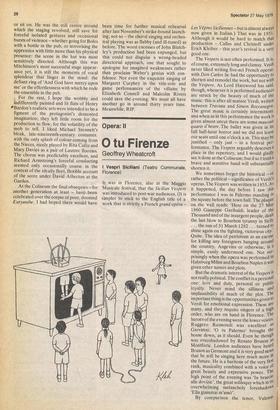O pera: I I
0 tu Firenze
Geoffrey Wheatcroft
I Vesprl Maisel (Teatro Communale, Florence)
It was in Florence, also at the Maggio Musicale festival, that the Sicilian Vespers was introduced to post-war audiences. (It is simpler to stick to the English title of a work that is strictly a French grand opera — Les Vepres Siciliennes —but is almost always now given in Italian.) That was in 1951. Although it would be hard to match that production — Callas and Christoff under Erich Kleiber — this year's revival is a very good one. The Vespers is not often performed. It is, of course, extremely long and clumsy. Verdi never liked writing five-act French operas: with Don Carlos he had the opportunity W shorten and remodel the work, but not with the Vespers. As Lord Harewood has said, though, whenever it is performed audiences are struck by the beauty of much of the music: this is after all mature Verdi, written between Traviata and Simon Boccanegra. The great music is certainly intermittent, and when as in this performance the work is given almost uncut there are some mauvais quarts d' heure. The ballet was given in its full half-hour horror and we did not leave our seats until one o'clock a.m. This may he justified — only just — in a festival performance. The Vespers arguably deserves 8 place in the repertory, and I would gladlY see it done at the Coliseum; but if so I trusts brave and sensitive hand will substantiallY shorten it.
We sometimes forget the historical — or rather the political — significance of Verdi's operas. The Vespers was written in 1855. As it happened, the day before I saw this performance I was in Palermo standing in the square before the town hall. The plaque on the wall reads: 'Here on the 27 MaY 1860 Giuseppe Garibaldi, leader of the Thousand and of the insurgent people, dealt the last blow to Bourbon tyranny in Sicily . . . the sun of 31 March 1282. . . turned to, shine again on the fighting, victorious city. Quite. The idea of patriotism as an excuse for killing any foreigners hanging around the country, Angevins or otherwise, is a simple, easily understood one. Not surprisingly when the opera was performed ia Habsburg Milan and Bourbon Naples it was given other names and plots. But the dramatic interest of the Vespers is not really political. The conflict is a personal
one: love and duty, personal or public loyalty. Never mind the silliness and implausibility of much of the plot. The important thing is the opportunities given to
Verdi for emotional expression. These are many, and they require singers of a high order, who are on hand in Florence. The heroes of the evening were the lower voices. Ruggero Raimondi was excellent as
Giovanni: '0 tu Palermo' brought the
house down, as it should. Even he though was overshadowed by Renato Bruson as,
Montforte. London audiences have hear"
Bruson as Germont and it is very good news that he will be singing here much more la
the future. He is a baritone of the very first
rank, musicality combined with a voice of great beauty and expressive power. The high point of the evening was 'In braccio alle dovizie', the great soliloquy which in its overwhelming melancholy foreshadoWs 'Ella giammai m'amo'.
By comparison the tenor, Valenio Luchetti, was rather disappointing, especially at the top of his voice. And that must unfortunately be said as well of Renata Scotto's Elena. It is admittedly a hideously difficult part, and from time to time it defeated Scotto. She has at least got a true Pianissimo, which is more than can be said for most sopranos, and she used it to good effect in the Act IV cantilena. But for an example of the sort of supreme bet canto Which can get round this part Florence had to wait until Montserrat Caballe arrived for her recital a few days later.
Those who heard Riccardo Muti'sAida in London last year do not need to be told that he is a wonderful Verdi conductor. There were some very brisk tempi, but by the end of the evening I wasn't sure if I should Complain about that. The production by Franco Enriquez and the design by Pier Luigi Samarazini were frankly dull, and a seintory reminder of the high standards we !lave come to expect, because we get them, % England. If, as! have suggested, the ENO Mounted the Vespers, the costumes would be a great deal more convincing, the performers would have a better idea of where they were meant to be at any given moment and the crowd scenes would be less clumsy. Never mind. The best thing that can be said for this production is that it was not the Work of an East German. Come to think of It, that is not faint praise nowadays.
A last point. This was a performance of festival quality of an epic opera, with at least three internationally renowned singers, under the hand of a masterly conductor. The Florentines, or those who could get in, Paid a top price of 7500 lire for a seat, that Is, less than ES per stall. Chuck it, Tooley!



































 Previous page
Previous page